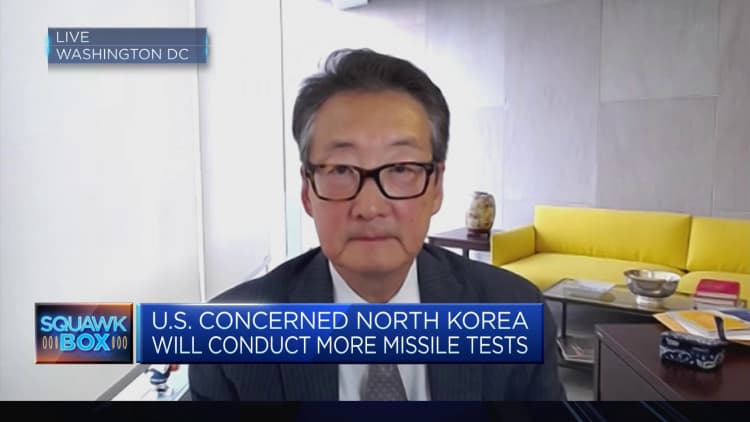
The US has been working hard over the past year to engage North Korea on denuclearization — but Pyongyang has shown no interest, said Victor Cha, senior vice president for Asia and Korea Chair at the Center for Strategic and International Studies.
“We can’t just assume that because the United States wants to talk, North Korea will come to the table,” Cha told CNBC’s “Squawk Box Asia” on Tuesday.
“The problem right now is that North Korea is not picking up the phone, answering the door, and not showing interest through various interlocutors that they are willing to come back to talk. [about] their nuclear program now,” he said.
The two countries have been sparring over North Korea’s nuclear threats and actions in South Korea for years.
Early Wednesday, North Korea fired two short-range ballistic missiles eastward, hours after a US nuclear-armed submarine landed in South Korea — the first in decades.
Last week, the reclusive nation launched a long-range ballistic missile into its eastern waters, what experts say is likely a development Hwasong-18 ICBM – which is harder to detect or intercept than in liquid-fuels.
It was North Korea’s first long-range missile test since April, and was thought to have been triggered by an alleged US spy plane attack.
People watch a television broadcast showing a file image of a North Korean rocket launch at Seoul Railway Station on May 31, 2023 in Seoul, South Korea.
Chung Sung-jun | Getty Images News | Getty Images
South Korean President Yoon Suk Yeol and White House Indo-Pacific Coordinator Kurt Campbell met in Seoul Tuesday for the inaugural meeting of the Nuclear Consultative Group (NCG).
Cha said the purpose of the meeting was for the US to show South Korea a “look inside the nuclear box,” and to gain confidence that the US is committed to defending South Korea against North Korea using nuclear weapons. its capabilities.
The meeting comes nearly three months after US President Joe Biden and Yoon issued the Washington Declaration.
Under the Washington Declaration, the US will not send nuclear weapons to South Korea, instead increasing the number of weapons and military vehicles it sends to the country in the interim.
South Korea’s relationship with China
China has expressed concerns that the NCG could lead to an arms race and instability on the Korean peninsula.
But Cha said the US was only “proactive” rather than “provocative.”
“China does not like anything the United States does with its allies to strengthen the alliance… The Chinese will always frame it as a threat to their interests because they want to dismantle the US alliance system,” he said.
“If the US alliance system breaks down in Asia, it will have a big impact not only in the field of security, but also in the field of economy and finance,” added Cha.
Despite their differing views, South Korea still strives to have good relations with China, its most important economic partner.
South Korea wants a relationship based on mutual respect, which means “they don’t want the Chinese dictating to them how it can manage its own sovereign security,” Cha said.
